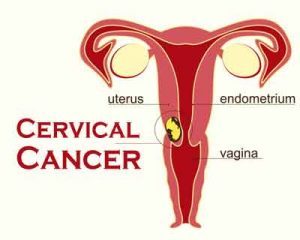- Home
- Editorial
- News
- Practice Guidelines
- Anesthesiology Guidelines
- Cancer Guidelines
- Cardiac Sciences Guidelines
- Critical Care Guidelines
- Dentistry Guidelines
- Dermatology Guidelines
- Diabetes and Endo Guidelines
- Diagnostics Guidelines
- ENT Guidelines
- Featured Practice Guidelines
- Gastroenterology Guidelines
- Geriatrics Guidelines
- Medicine Guidelines
- Nephrology Guidelines
- Neurosciences Guidelines
- Obs and Gynae Guidelines
- Ophthalmology Guidelines
- Orthopaedics Guidelines
- Paediatrics Guidelines
- Psychiatry Guidelines
- Pulmonology Guidelines
- Radiology Guidelines
- Surgery Guidelines
- Urology Guidelines
Only 10-20 percent rural Indian women aware about cervical cancer

According to the survey, an estimated 62,416 cervical cancer deaths were reported across the world in 2015, which is the eight per cent of the total deaths caused by cancers altogether.
NEW DELHI: Only 10-20 percent of the Indian women in rural areas have awareness about cervical cancer, even if it is the fourth most common cause of death among women, said a survey.
According to the survey, an estimated 62,416 cervical cancer deaths were reported across the world in 2015, which is the eight per cent of the total deaths caused by cancers altogether. The peak age of incidence of cervical cancer is 55-59 years, and a considerable proportion of women report in the late stages of disease.
The survey also states that mong the reasons that triggers cervical cancers includes smoking, a weak immune system, birth control pills, starting sex at a young age, and having many sexual partners.
"Majority of the cases emerge because women do not under go screening. Cervical cancer screening should be started at age of 21 years. How often you should have cervical cancer screening depends on your age and health history," said Nupur Gupta, gynaecologist and obstetrician at Well Women Clinic.
She advised women aged 21-29 years should have a Pap test, used for screening of the disease, every three years, while women aged 30-65 should have this and HPV tests every five years.
"HPV vaccines protect against two and seven high-risk strains of this family of viruses and may prevent up to 90 per cent of cervical cancers," said Gupta.
Gauri Mathur of All India Institute of Medical Sciences(AIIMS) said: "Today the situation of cervical cancer is such in India that they account for the largest proportion of women deaths in India apart from breast cancers. But still there is no awareness."
"The government has been evaluating introduction of a cervical cancer vaccine as part of its immunisation drive to prevent the disease among women. At present, there are three vaccines that are available to prevent human papillomavirus (HPV) types that cause cervical cancer. However women are not entirely aware about it due to which they continue to suffer," she said.
NEW DELHI: Only 10-20 percent of the Indian women in rural areas have awareness about cervical cancer, even if it is the fourth most common cause of death among women, said a survey.
According to the survey, an estimated 62,416 cervical cancer deaths were reported across the world in 2015, which is the eight per cent of the total deaths caused by cancers altogether. The peak age of incidence of cervical cancer is 55-59 years, and a considerable proportion of women report in the late stages of disease.
The survey also states that mong the reasons that triggers cervical cancers includes smoking, a weak immune system, birth control pills, starting sex at a young age, and having many sexual partners.
"Majority of the cases emerge because women do not under go screening. Cervical cancer screening should be started at age of 21 years. How often you should have cervical cancer screening depends on your age and health history," said Nupur Gupta, gynaecologist and obstetrician at Well Women Clinic.
She advised women aged 21-29 years should have a Pap test, used for screening of the disease, every three years, while women aged 30-65 should have this and HPV tests every five years.
"HPV vaccines protect against two and seven high-risk strains of this family of viruses and may prevent up to 90 per cent of cervical cancers," said Gupta.
Gauri Mathur of All India Institute of Medical Sciences(AIIMS) said: "Today the situation of cervical cancer is such in India that they account for the largest proportion of women deaths in India apart from breast cancers. But still there is no awareness."
"The government has been evaluating introduction of a cervical cancer vaccine as part of its immunisation drive to prevent the disease among women. At present, there are three vaccines that are available to prevent human papillomavirus (HPV) types that cause cervical cancer. However women are not entirely aware about it due to which they continue to suffer," she said.
Next Story
NO DATA FOUND

Disclaimer: This site is primarily intended for healthcare professionals. Any content/information on this website does not replace the advice of medical and/or health professionals and should not be construed as medical/diagnostic advice/endorsement or prescription. Use of this site is subject to our terms of use, privacy policy, advertisement policy. © 2020 Minerva Medical Treatment Pvt Ltd